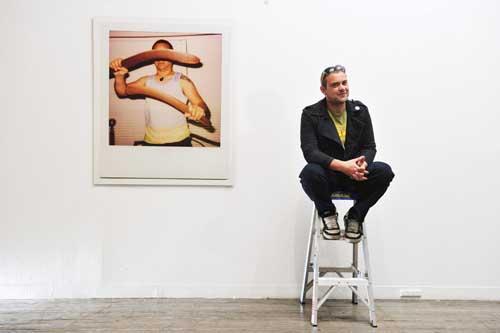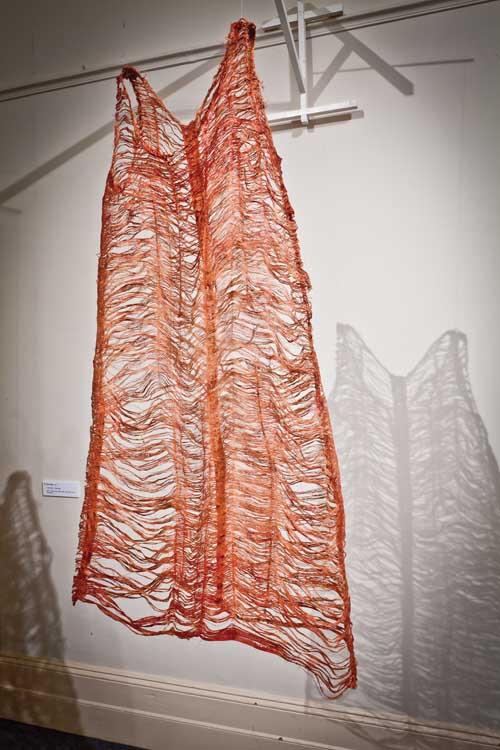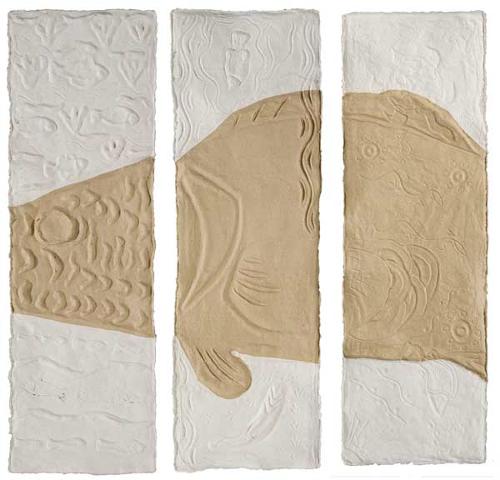
97 x 127cm. Courtesy the artist and Sullivan+Strumpf Fine Art.
There is something perversely beautiful about the work of Arlene TextaQueen. Presenting herself as some sort of modern day superhero, the Melbourne-based artist uses textas to create exquisitely decorative TextaNudes that take the form of playing cards. Each card depicts women 'un- dressed- up' with props in constructed scenarios of their choice. A string of text is written across each card, derived from conversations TextaQueen had with each subject, and like the carefully composed background it gives an insight into the woman we are looking at.
Despite the almost comic-like style of the work, these TextaNudes are completely unnerving. Perhaps it is that the medium of textas is more commonly associated with a child-like naivety, far removed from the overtly sexualised figures in the playing cards. Perhaps it is the defiant stance and confronting stares of the women - their gaze daring you to look away while making it clear they will not be judged.
This is evident in the work You didn’t love me when I lived there (Fem Appeal as Josephine Baker), which is reminiscent of Édouard Manet’s famous 1863 painting Olympia. Each show a naked woman reclining, an air of nonchalance about her, confidence and self-possession evident in her stare. Just as Manet incorporated a black cat as a symbol of prostitution, TextaQueen has incorporated a toy tiger resting comfortably under the woman’s arm. Far from being a reference to prostitution, this child’s toy supports and compliments the kitsch aesthetic.
Nothing is natural about the work of TextaQueen, all her images are contrived and carefully constructed to compliment the subject matter. The artist spends as much attention and detail on these backdrops as she does on the subject and it formulates a persona. Better than flowers (Tave) shows a woman, legs spread, sitting on a stool, a My Little Pony figurine covering her crotch which she strokes absently. The words ‘Better than flowers’ weave around her head as she stares coyly at the viewer and we are left in no doubt that she is in control of the situation.
Heavily feminist with undertones of queer politics, TextaNudes could easily be dismissed as overtly gaudy and intentionally provocative - and perhaps it is - however this does not diminish the evident skill of the artist. When considering the sheer detail apparent in each of the works it is hard to believe it was achieved with a texta, not dissimilar from the one you no doubt used as a child.
But the work of TextaQueen is about more than simple voyeurism. The artist engages with her subjects and this relationship is conveyed through the work to the viewer. TextaNudes represents the exchange between artist and subject and between the artwork and the viewer. Given the artist’s superhero persona which she manifests and cultivates, the work is not all about the TextaQueen herself. This series in particular is predominantly about the subjects and the dialogue that ensued from each sitting.
Adding to the cult element which seems to surround TextaQueen are the reproductions and multiples she creates of her work. For a minimal amount anyone can leave the gallery with their very own deck of TextaNude playing cards, guaranteed to spice up any game of poker. This take-home aspect to the exhibition perfectly complements the cheeky and playful work and demonstrates an absence of pretension. Here is an artist who clearly does not take themselves, or their work, too seriously. That’s why you like her.
Like nothing you’ve seen lately, TextaNudes not only asks for your attention - it demands it. The women are defiant, powerful and making no apologies for who they are - and why should they - they’re beautiful. Perhaps that is the overall point. Behind the mask of overt sexuality is the subtle reminder that often beauty is about more than aesthetics and what is seen. TextaQueen takes the viewer behind the exterior to the naked truth underneath. It may be unnerving and a bit brash but at least it’s honest. TextaNudes is as commanding as the artist herself.












